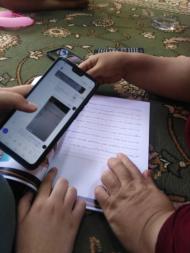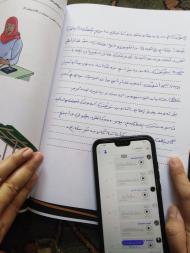The pandemic hit Iraq hard. Women have lived in and out of repeated lockdowns as COVID-19 cases spike, haltingly recede, and spike again. It’s made resuming women’s training a challenge.
But women’s futures can’t wait.
Staff innovated to resume trainings safely, remotely—and online. Women are pleased they can continue to build their power, even from afar. While stuck at home, women have found solace in online groups. They improve their lives with lessons they can immediately apply to their families, health, and home life. With many of their communities at economic standstills, learning business and financial skills have been helpful for savings but also kindling hope for future enterprises and plans.
Trainers organized women into smaller groups than during in-person trainings, to help maintain personal connections with trainers and between women. Each week, participants receive a recording in their group on Viber or WhatsApp, adapted from groups formed to share coronavirus information. Throughout the week, women complete and send back photos of their assignments along with questions or responses through video or voice recordings.
At home, mothers sometimes listen to lessons with their daughters, passing on and growing women’s power.
Though the benefits of adapting training online during the pandemic are clear, the transition process was not so straightforward. Big obstacles such as limited literacy rates, undependable internet connections, and access to personal phones stood in the way.
Finding solutions required listening and working with participants. The team began by calling women to gauge their availability and comfort with using technology. They had to understand what women needed to tailor trainings for women’s contexts in this strange time.
Learning Despite Literacy
"It was a long process to decide when to launch online classes. We were worried about the level of women's literacy,” said Shan, the Economic Empowerment Manger in Iraq. “We still face a lot of difficulties."
Trainers sent participants screenshots to guide them through using mobile and virtual tools. Some walked women through apps and joining groups through voice conversations. Delivering classes via voice and video were crucial for women’s ability to participate.
It hasn’t been easy for trainers, who are used to working off bodily and emotional cues to keep participants engaged in lessons. They ask more questions in order to gauge comfort and understanding with subject matter. Class activities are usually designed to account for limited literacy or delivered as group projects, which trainers now have to figure out how to adapt as individual homework assignments or discussions.
One example is an exercise strengthening business skills. In small groups, women would have worked through a list to identify expenditures and incomes, calculating profit, among other activities. Trainers adapted this into sharing a list with pictures and labels in women’s native languages that list costs in Iraqi denar, along with reading it aloud. Women would then reply with what is an expenditure and what helps with income through voice messages.
Staff and participants remained determined, tackling each lesson and obstacle as it comes. After all, trainers know women both want and need these resources, knowledge, and tools, and participants have been supportive and collaborative.
Coordination, Flexibility, and Internet Connectivity
Initially, group calls were the main mode of delivering training, meant to emulate when women could gather at the same time in the same place. But not every woman had access to internet at the same time. Set, stable connection at home aren’t a given.
Many families have a portable internet hotspot but for families where men are still able to work, men often bring the internet with them to help earn income. Some women who don’t have internet at home at all would have to coordinate with relatives for visits to join sessions.
The team realized they had to be more flexible in the approach. They delivered live group trainings and then recorded another version to send to the groups for those who could not join. Participants found the extra step unnecessary and encouraged trainers to just send out recordings. The team was happy to oblige.
Each session now spans across the week, so women can listen and respond to trainings when it’s convenient, whether it’s when husbands return home with the internet or at another location. During activities, they’ll wait for each other’s recorded responses. They turn in handbook assignments through photographs.
Until recently, women would do their work on a paper and then upload it. But when staff were finally permitted to share cash support with women during an ease in coronavirus restrictions, they also delivered women’s handbooks.
Technological Comfort and Trust
Early conversations gauged women’s comfort with switching to mobile groups to continue trainings despite lockdowns. Some women expressed worry at first, unsure of what their phone numbers would be used for. Their numbers are considered sensitive, private information, with many fearing harassment from men if it’s discovered.
Staff took these concerns seriously and assured women that their information would remain confidential. Strict ground rules were shared in the mobile groups to prohibit contact sharing, creating circles of trust. To ensure everyone was aligned, these rules were shared as a voice message in both Kurdish and Arabic.
"It took a little bit from the women to warm up to the idea of online classes. But right now, they love it, they are in the group waiting for their teachers even before they join,” said Shan.
Until We Meet Again
Despite the innovations staff and participants have found to continue learning online, it hasn’t been a replacement for in-person trainings. There have been technological hiccups, like both Viber and WhatsApp initially blocking all the groups due to misunderstandings—issues that have since been fixed.
There are also deeper needs, like emotional support and connection. Women in the communities we serve endure conflict and gender discrimination alongside this disease. Loneliness can be despairing. The solidarity forged in safe spaces where women can be together and heal together play a huge role in growing women’s power.
The team in Iraq continues to do their part to keep hope alive, together with participants. Vocational trainings are another part of the program that suffers from social distancing and is best delivered in-person. For skills like tailoring, naturally women want to go to the training center and practice cutting and sewing cloth with their hands.
But with high rates of COVID cases—some even affecting participants of the program—social distancing is the current face of care and support. Staff continue to explore solutions that can work for women we serve. They’re also drafting what they’ve learned from this experience to share across the other country teams for remote trainings, like Nigeria the team is also exploring video recordings for groups that have yet to resume in-person.
“It might seem impossible but it's not impossible,” said Shan, adding, “The participants really enjoy it.”



